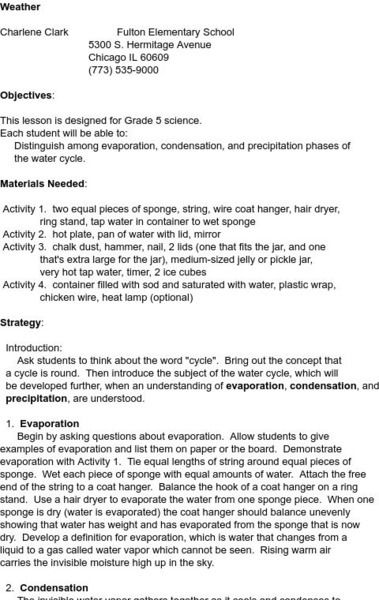University Corporation for Atmospheric Research
Ucar: What a Blizzard Needs
Learn the three ingredients that make a large snowstorm or blizzard.
American Chemical Society
Middle School Chemistry: Changing State: Evaporation
Learn how substances change from a liquid to a gaseous state in the process of evaporation.
American Chemical Society
Middle School Chemistry: Changing State Condensation
Explore the process of condensation as it pertains to molecular movement in water vapor.
Center for Educational Technologies
Earth Science Explorer: The Water Cycle
This is a very brief overview of the water cycle, but it does have a nice graphical representation.
University Corporation for Atmospheric Research
Ucar: Learn: The Greenhouse Effect
A detailed overview of the greenhouse effect, with explanations about Earth's atmosphere gases referred to as greenhouse gases, and the factors that influence the heat-trapping ability of a greenhouse. All information is reinforced...
University Corporation for Atmospheric Research
Ucar: Not Your Usual Pop!
Students learn how to crush a can with only air pressure.
University Corporation for Atmospheric Research
Ucar: Clouds in the Air: Why Are They There?
An experiment that demonstrates why there are clouds in the sky. Start with air, invisible water vapor, particles we call condensation nuclei, and air pressure...the cloud comes later!
CK-12 Foundation
Ck 12: Earth Science: Composition of the Atmosphere Study Guide
This comprehensive study guide covers the main terms and concepts needed for an earth science unit on the composition of the atmosphere. Review questions are included at the bottom of the study guide.
University Corporation for Atmospheric Research
Ucar: Humidity
The amount of water vapor in the air is called humidity.
University Corporation for Atmospheric Research
Ucar: What's in the Air?
Air is a mixture of naturally occurring gases and human-made air pollutants. Learn more about these gases and the role they play in our atmosphere.
Science Buddies
Science Buddies: Make a Hygrometer to Measure Humidity
Learn how to make a hygrometer to measure the humidity level in the air.
New York University
New York University: States of Water
Use this resource to learn about the three different phases of water; solid, liquid, and gas. What happens to water as it changes into a solid or gas? Includes short and easy to do activity.
Science and Mathematics Initiative for Learning Enhancement (SMILE)
Smile: Weather
This lesson plan focuses on teaching students to distinguish among the evaporation, condensation,and precipitation phases of the water cycle.
Other
60 Second Science: Air Putting It to Work
Investigate the properties of air. Observe the water vapor present in our exhaled breath.
Science Fun for Everyone
Science Fun: Make It Rain
Can you make it rain without doing a dance? Follow the steps in this science experiment to try it!







